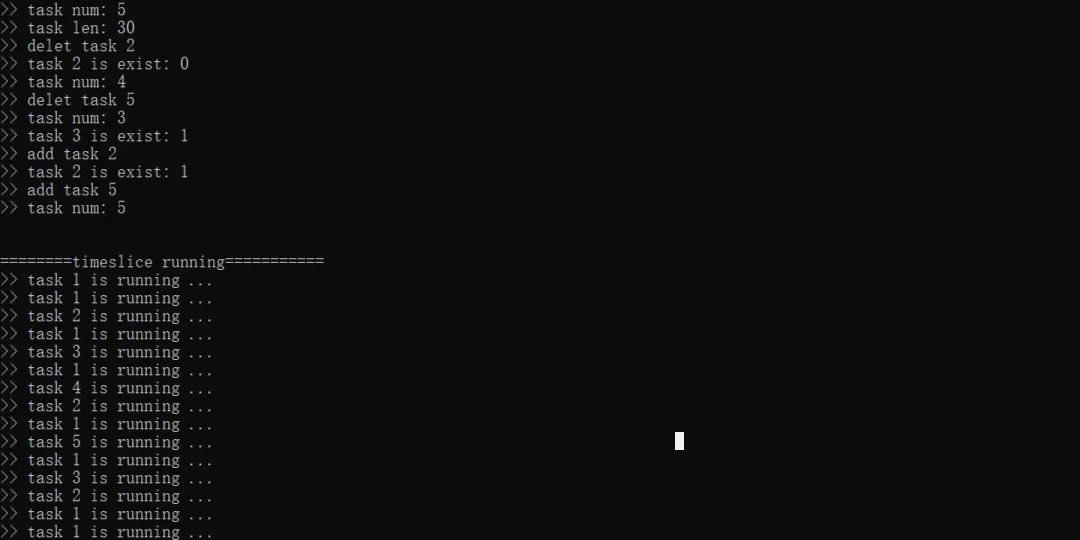Hello everyone, today I am sharing an article about a microcontroller program framework.
1. Importance of Program Framework
2. Program Example
#include <thread>#include <stdio.h>#include <windows.h>#include "timeslice.h"
// Create 5 task objectsTimesilceTaskObj task_1, task_2, task_3, task_4, task_5;
// Specific task functionsvoid task1_hdl(){ printf(">> task 1 is running ...\n");}
void task2_hdl(){ printf(">> task 2 is running ...\n");}
void task3_hdl(){ printf(">> task 3 is running ...\n");}
void task4_hdl(){ printf(">> task 4 is running ...\n");}
void task5_hdl(){ printf(">> task 5 is running ...\n");}
// Initialize task objects and add tasks to the time-slice polling schedulevoid task_init(){ timeslice_task_init(&task_1, task1_hdl, 1, 10); timeslice_task_init(&task_2, task2_hdl, 2, 20); timeslice_task_init(&task_3, task3_hdl, 3, 30); timeslice_task_init(&task_4, task4_hdl, 4, 40); timeslice_task_init(&task_5, task5_hdl, 5, 50); timeslice_task_add(&task_1); timeslice_task_add(&task_2); timeslice_task_add(&task_3); timeslice_task_add(&task_4); timeslice_task_add(&task_5);}
// Start two threads to simulate the running process on the microcontrollervoid timeslice_exec_thread(){ while (true) { timeslice_exec(); }}
void timeslice_tick_thread(){ while (true) { timeslice_tick(); Sleep(10); }}
int main(){ task_init();
printf(">> task num: %d\n", timeslice_get_task_num()); printf(">> task len: %d\n", timeslice_get_task_timeslice_len(&task_3));
timeslice_task_del(&task_2); printf(">> delete task 2\n"); printf(">> task 2 exists: %d\n", timeslice_task_isexist(&task_2));
printf(">> task num: %d\n", timeslice_get_task_num());
timeslice_task_del(&task_5); printf(">> delete task 5\n");
printf(">> task num: %d\n", timeslice_get_task_num());
printf(">> task 3 exists: %d\n", timeslice_task_isexist(&task_3)); timeslice_task_add(&task_2); printf(">> add task 2\n"); printf(">> task 2 exists: %d\n", timeslice_task_isexist(&task_2));
timeslice_task_add(&task_5); printf(">> add task 5\n");
printf(">> task num: %d\n", timeslice_get_task_num());
printf("\n\n========timeslice running===========\n");
std::thread thread_1(timeslice_exec_thread); std::thread thread_2(timeslice_tick_thread);
thread_1.join(); thread_2.join();
return 0;}The running result is as follows:

3. Time-Slice Polling Framework
This part mainly uses object-oriented thinking, using structures as objects and using structure pointers as parameters to save resources and achieve high operational efficiency.
#ifndef _TIMESLICE_H#define _TIMESLICE_H
#include "./list.h"
typedef enum { TASK_STOP, TASK_RUN} IsTaskRun;
typedef struct timesilce{ unsigned int id; void (*task_hdl)(void); IsTaskRun is_run; unsigned int timer; unsigned int timeslice_len; ListObj timeslice_task_list;} TimesilceTaskObj;
void timeslice_exec(void);void timeslice_tick(void);void timeslice_task_init(TimesilceTaskObj* obj, void (*task_hdl)(void), unsigned int id, unsigned int timeslice_len);void timeslice_task_add(TimesilceTaskObj* obj);void timeslice_task_del(TimesilceTaskObj* obj);unsigned int timeslice_get_task_timeslice_len(TimesilceTaskObj* obj);unsigned int timeslice_get_task_num(void);unsigned char timeslice_task_isexist(TimesilceTaskObj* obj);
#endif#include "./timeslice.h"
static LIST_HEAD(timeslice_task_list);
void timeslice_exec(){ ListObj* node; TimesilceTaskObj* task;
list_for_each(node, ×lice_task_list) {
task = list_entry(node, TimesilceTaskObj, timeslice_task_list); if (task->is_run == TASK_RUN) { task->task_hdl(); task->is_run = TASK_STOP; } }}
void timeslice_tick(){ ListObj* node; TimesilceTaskObj* task;
list_for_each(node, ×lice_task_list) { task = list_entry(node, TimesilceTaskObj, timeslice_task_list); if (task->timer != 0) { task->timer--; if (task->timer == 0) { task->is_run = TASK_RUN; task->timer = task->timeslice_len; } } }}
unsigned int timeslice_get_task_num(){ return list_len(×lice_task_list);}
void timeslice_task_init(TimesilceTaskObj* obj, void (*task_hdl)(void), unsigned int id, unsigned int timeslice_len){ obj->id = id; obj->is_run = TASK_STOP; obj->task_hdl = task_hdl; obj->timer = timeslice_len; obj->timeslice_len = timeslice_len;}
void timeslice_task_add(TimesilceTaskObj* obj){ list_insert_before(×lice_task_list, &obj->timeslice_task_list);}
void timeslice_task_del(TimesilceTaskObj* obj){ if (timeslice_task_isexist(obj)) list_remove(&obj->timeslice_task_list); else return;}
unsigned char timeslice_task_isexist(TimesilceTaskObj* obj){ unsigned char isexist = 0; ListObj* node; TimesilceTaskObj* task;
list_for_each(node, ×lice_task_list) { task = list_entry(node, TimesilceTaskObj, timeslice_task_list); if (obj->id == task->id) isexist = 1; }
return isexist;}
unsigned int timeslice_get_task_timeslice_len(TimesilceTaskObj* obj){ return obj->timeslice_len;} 4. Low-Level Intrusive Doubly Linked List
#ifndef _LIST_H#define _LIST_H
#define offset_of(type, member) (unsigned long) &((type*)0)->member#define container_of(ptr, type, member) ((type *)((char *)(ptr) - offset_of(type, member)))
typedef struct list_structure{ struct list_structure* next; struct list_structure* prev;} ListObj;
#define LIST_HEAD_INIT(name) {&(name), &(name)}#define LIST_HEAD(name) ListObj name = LIST_HEAD_INIT(name)
void list_init(ListObj* list);void list_insert_after(ListObj* list, ListObj* node);void list_insert_before(ListObj* list, ListObj* node);void list_remove(ListObj* node);int list_isempty(const ListObj* list);unsigned int list_len(const ListObj* list);
#define list_entry(node, type, member) \ container_of(node, type, member)
#define list_for_each(pos, head) \ for (pos = (head)->next; pos != (head); pos = pos->next)
#define list_for_each_safe(pos, n, head) \ for (pos = (head)->next, n = pos->next; pos != (head); \ pos = n, n = pos->next)
#endif#include "list.h"
void list_init(ListObj* list){ list->next = list->prev = list;}
void list_insert_after(ListObj* list, ListObj* node){ list->next->prev = node; node->next = list->next;
list->next = node; node->prev = list;}
void list_insert_before(ListObj* list, ListObj* node){ list->prev->next = node; node->prev = list->prev;
list->prev = node; node->next = list;}
void list_remove(ListObj* node){ node->next->prev = node->prev; node->prev->next = node->next;
node->next = node->prev = node;}
int list_isempty(const ListObj* list){ return list->next == list;}
unsigned int list_len(const ListObj* list){ unsigned int len = 0; const ListObj* p = list; while (p->next != list) { p = p->next; len++; }
return len;}Thus, a brand new, completely decoupled, and very convenient time-slice polling framework is completed.
Click to read the original text and apply for free